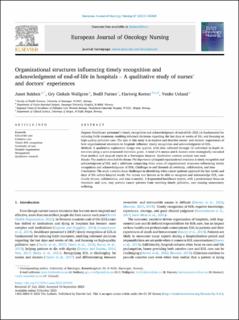| dc.contributor.author | Bakken, Janet | |
| dc.contributor.author | Wallgren, Gry Ciekals | |
| dc.contributor.author | Furnes, Bodil | |
| dc.contributor.author | Kørner, Hartwig | |
| dc.contributor.author | Ueland, Venke Irene | |
| dc.date.accessioned | 2023-11-15T09:33:20Z | |
| dc.date.available | 2023-11-15T09:33:20Z | |
| dc.date.created | 2023-11-08T13:22:08Z | |
| dc.date.issued | 2023 | |
| dc.identifier.citation | Bakken, J., Wallgren, G. C., Furnes, B., Kørner, H., & Ueland, V. (2023). Organizational structures influencing timely recognition and acknowledgment of end-of-life in hospitals–A qualitative study of nurses' and doctors’ experiences. European Journal of Oncology Nursing, 67, 102420. | en_US |
| dc.identifier.issn | 1462-3889 | |
| dc.identifier.uri | https://hdl.handle.net/11250/3102642 | |
| dc.description.abstract | Healthcare personnel's timely recognition and acknowledgment of end-of-life (EOL) is fundamental for reducing futile treatment, enabling informed decisions regarding the last days or weeks of life, and focusing on high-quality palliative care. The aim of this study is to explore and describe nurses' and doctors' experiences of how organizational structures in hospitals influence timely recognition and acknowledgment of EOL.
A qualitative explorative design was applied, with data collected through 12 individual in-depth interviews using a semi-structured interview guide. A total of 6 nurses and 6 doctors were strategically recruited from medical and surgical wards in a Norwegian hospital. Qualitative content analysis was used.
The analysis revealed the theme The importance of hospital organizational structures in timely recognition and acknowledgment of EOL and a subtheme comprising three areas of organizational structures influencing timely recognition and acknowledgment of EOL; Challenges to and demands of continuity, collaboration, and time.
The study's results show challenges in identifying when cancer patients approach the last weeks and days of life within hospital wards. For nurses and doctors to be able to recognize and acknowledge EOL, continuity of care, collaboration, and time is needed. A fragmented healthcare system, with a predominant focus on treatment and cure, may prevent cancer patients from receiving timely palliative, care causing unnecessary suffering. | en_US |
| dc.language.iso | eng | en_US |
| dc.publisher | Elsevier | en_US |
| dc.rights | Navngivelse 4.0 Internasjonal | * |
| dc.rights.uri | http://creativecommons.org/licenses/by/4.0/deed.no | * |
| dc.title | Organizational structures influencing timely recognition and acknowledgment of end-of-life in hospitals – A qualitative study of nurses' and doctors’ experiences | en_US |
| dc.title.alternative | Organizational structures influencing timely recognition and acknowledgment of end-of-life in hospitals – A qualitative study of nurses' and doctors’ experiences | en_US |
| dc.type | Peer reviewed | en_US |
| dc.type | Journal article | en_US |
| dc.description.version | publishedVersion | en_US |
| dc.rights.holder | © The Author(s) 2023 | en_US |
| dc.subject.nsi | VDP::Medisinske Fag: 700 | en_US |
| dc.source.journal | European Journal of Oncology Nursing | en_US |
| dc.identifier.doi | 10.1016/j.ejon.2023.102420 | |
| dc.identifier.cristin | 2193934 | |
| cristin.ispublished | true | |
| cristin.fulltext | original | |
| cristin.qualitycode | 1 | |

